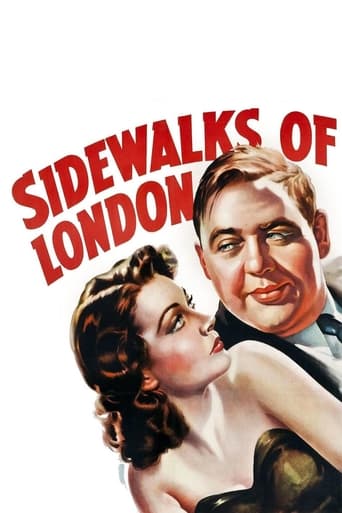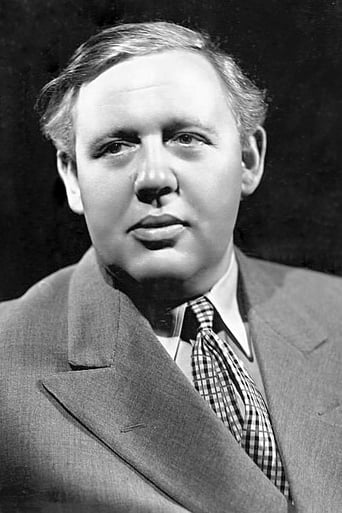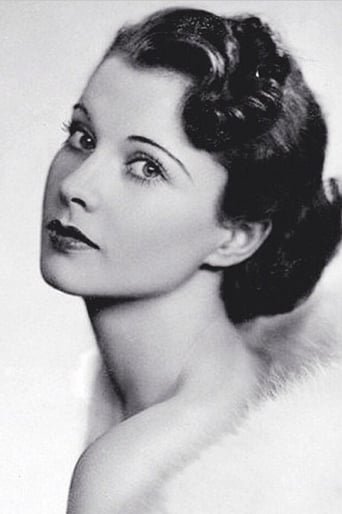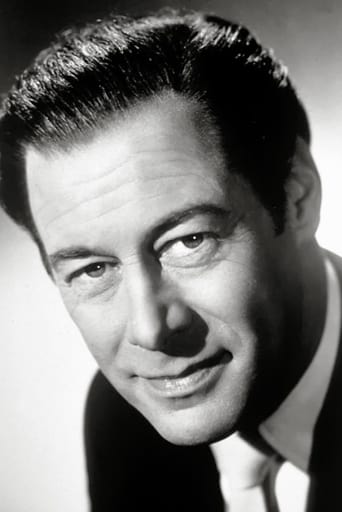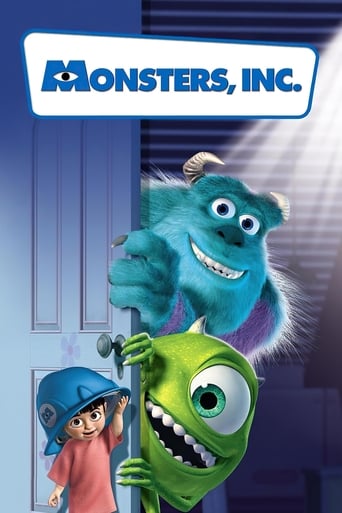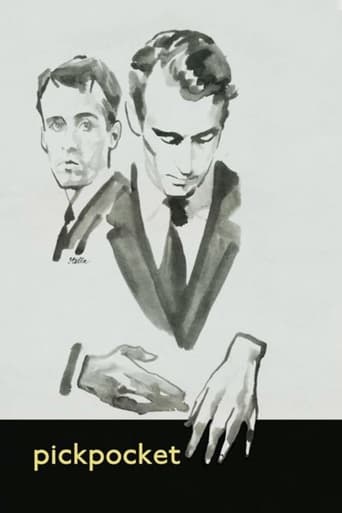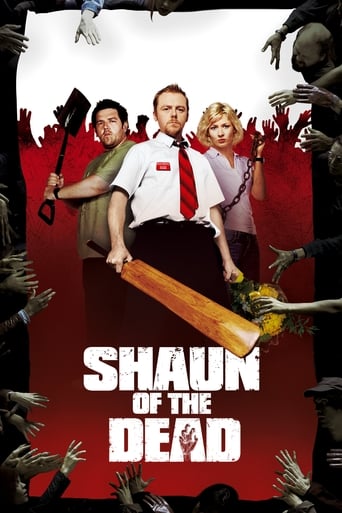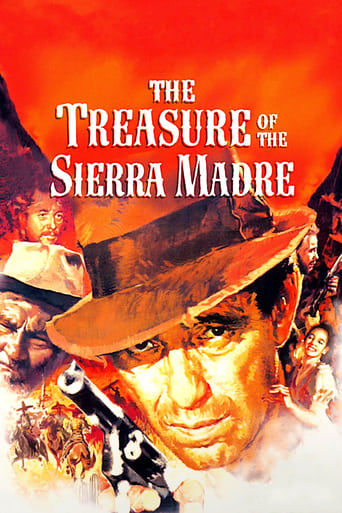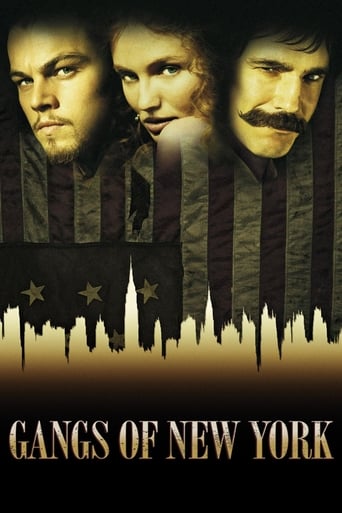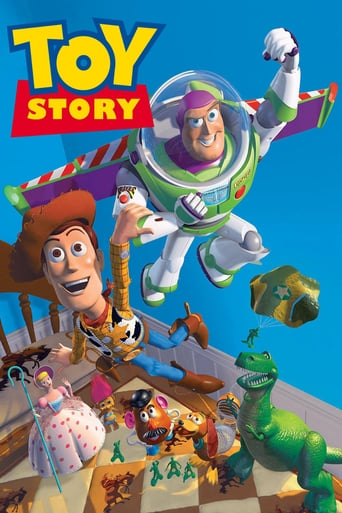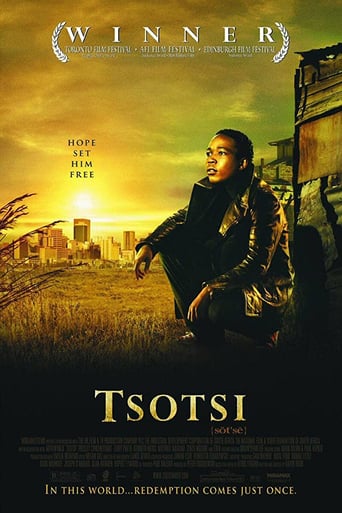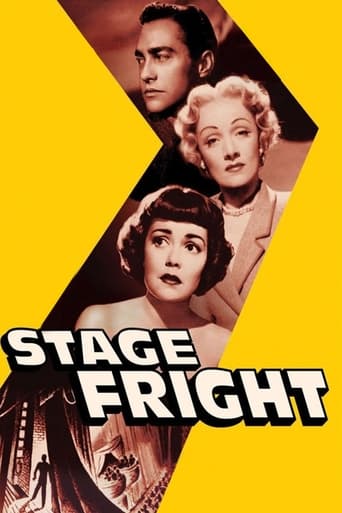St. Martin's Lane (1938)
On the sidewalks of the London theater district the buskers (street performers) earn enough coins for a cheap room. Charles, who recites dramatic monologues, sees that a young pickpocket, Libby, also has a talent for dancing and adds her to his act. Harley, the theater patron who never knew Libby took his gold cigarette case, is impressed by Libby's dancing and invites her to bring Charles and the other buskers in his group to an after-the-play party. Libby comes alone. A theatrical career is launched.
Watch Trailer
Cast


Similar titles
Reviews
Funny, strange, confrontational and subversive, this is one of the most interesting experiences you'll have at the cinema this year.
A movie that not only functions as a solid scarefest but a razor-sharp satire.
Like the great film, it's made with a great deal of visible affection both in front of and behind the camera.
This movie tries so hard to be funny, yet it falls flat every time. Just another example of recycled ideas repackaged with women in an attempt to appeal to a certain audience.
Wow. Here's a great little serio/comic offering from pre-WWII Great Britain in which both Charles Laughton and Vivien Leigh get to demonstrate the reasons why they were superstars. This movie will delight anyone who loves classic movies, as it really contains all the elements necessary to make it one of the finest movies from the Brits in the 1930's. There's high-octane and undiluted star power from the lead actors, a fast-paced, sensitive and witty script, fine photography that rivals the best done in Hollywood, distinctive and expert work from the supporting players, and some enjoyable musical numbers.But first mention should go to top-billed Charles Laughton, who carries the film and puts his heart and soul into his performance. I certainly realize that many discriminating viewers of today may find his histrionics to be "over the top" or "ham." It's true that the man seems larger than life, with his often booming voice, hulking physicality and overstated expressions of emotion. Yet, we are still willingly taken in by him, as he is genius in evoking either pathos or disdain in the audience for his character. And he can be quite and thoughtful when the occasion calls for it, as evidenced in scenes late in the film. Quite a fantastic performance he gives here, and I think he's as good in this as in anything else he ever did.Laughton portrays a London street performer who excels in "recitations" from the works of Shakespeare, Kipling and others. He has a "meet-cute" with beautiful Vivien Leigh during one of his performances, and they soon develop a friendship and later -- an act. In typical dramatic fashion, musical composer Rex Harrison discovers Leigh's character and eventually gets her onto the legitimate London stage. The crux of the drama arises over Laughton's disappointment at being left behind, and Leigh coming to terms with her lowly origins. Fairly standard plotting certainly, but the script and performances make it first-rate by steering clear of stereotypes and stock characters.It's by no means a perfect little film, but still very enjoyable if only for the insight into London's West End in the 1930's. Laughton would be ill-served to be dismissed as a ham actor, certainly. Yes, he did shout and bellow in more than a few scenes, but it always comes out of the character. (I loved his recitation of "If" BTW!) He fantastic in the quiet moments, like when he gives the speech to all the others as he descends the stairs, or when he confesses his true desires to Leigh, or earlier when he tells her in the deserted home that "Life's a joke." All very poignant moments with much restraint exhibited on his part.Not surprisingly, Vivien Leigh is breathtakingly beautiful, but she also shows great energy and emotion, plus a nicely acted transformation from street waif to a popular actress on the West End. When she shares the screen with Laughton, there's a feeling that anything may happen between these two volatile characters, each with his and her own personal demons. She can be raucous and violent at times, or graceful, sweet and thoughtful at others. I've read that she and Laughton were not particularly fond of one another, and it's strange how sometimes that fact can elevate each actor's performance to a higher level! Less lucky is "Sexy Rexy" Harrison, who is practically steamrolled over by the leads in his thankless role. Anyway, he looks great, and avoids bumping into the furniture. The other supporting players fare much better, as does an adorable trained terrier who steals every scene he's in. The American director Tim Whelan really managed to create a slice of London life that's engaging, entertaining and emotional.I'd like to mention one little scene that struck my fancy. That's when all the buskers are at the pub after an evening work. Leigh has a line something like "It's all over." Then Laughton turns when he hears the tiny cockney voice saying, "She's right you know." He walks to the little old lady sitting in the corner, and she delivers a short speech about her and her family selling flowers when "the old queen" was alive. It's a neat little moment, put in for no reason that I can ascertain, since the old lady never figures into the story at all. I appreciate little scenes like that -- ones that easily could have been cut, but just add to the mosaic.**** out of *****
Reading the comments above from American users I was surprised about their apparent ignorance of London buskers or street performers.I am sure that they had their equivalent in New York's theatre district in 1938.Vivien was an accomplished dancer (witness her role of Myra the ballet student in "Waterloo Bridge" (1940) with Robert Taylor, and she had the opportunity to show off her terpsichorean ability in this film.I agree however with many of the comments above praising the acting of the three stars, Charlie Laughton, Rex Harrison and of course Viv.Nowadays, from what I can see buskers perform in one place in London's theatre district, at a big paved off area at Covent Garden - (the Health & Safety executive lobby is wide & all powerful!) Obviously this film has been overshadowed by Viv's more famous films, but I awarded it 7/10 as it shows off her versatility.My only criticism was her difficulty in maintaining an authentic Cockney accent but of course drama schools in the 1930s drummed out regional vernacular accents from their students, long before the current trend of casting actors with authentic sounding voices.My copy is on a "Double Kino Video Feature" along with Henry Fonda's "Wings of the Morning".Users who like this film should also seek out "Storm in a Teacup" who apart from Viv & Rex has Cecil Parker.
Bona Fide buskers have long been replaced by aggressive beggars,"Big Issue" vendors with mean - looking dogs and white guys with dreadlocks and body - piercings juggling tennis rackets that tend to intimidate rather than entertain theatre queues.Back in the forties and fifties you would happily throw a shilling to Wilson,Keppel and Betty lookalikes doing a sand dance in Shaftesbury Avenue or "The Happy Wanderers" street band playing their English Dixieland(they even made a couple of L.P.s for "Esquire" - now collectors' items).St Martin's Lane itself runs into the Charing Cross Road near Trafalgar Square and is at the heart of the West End theatre district.At the time the movie was made,buskers worked clearly delineated pitches,unwritten but fiercely enforced laws prevented them from working both sides of the street and there were indeed families of buskers as there were families of costermongers,both considered lucrative and honourable trades."St Martin's Lane" the movie contains the requisite warm - hearted cockneys, and patronising nobs.The London vernacular owes a lot to Mr Bernard Shaw,an impression further encouraged by both Mr C.Laughton and Mr R.Harrison who speak their lines with theatrical relish.It might even be a "Pygmalion" variation if you wish to see it as such,adding spice to Mr Harrison's characterisation with the benefit of hindsight. Whatever you might feel about that possible interpretation of the story, the undoubted crux of the whole show is Miss V.Leigh whose performance shouts "I'm a Star " from her first appearance on the screen.Rarely has an actress grasped a movie by the scruff of it's neck and dragged it up several grades single - handedly in so spectacular a fashion.She has innocence and joie de vivre,beauty and grace and the camera loved her. Try as Mr Laughton and Mr Harrison might,she cannot be upstaged. For all their bathos and charm respectively they have to take a back seat to Miss Leigh's explosion of talent and energy.Twenty years later what a wonderful Eliza Dolittle she would have made. No wonder she and her husband were two of the biggest names in the cinema and theatre for two decades. Her "English" period can be exemplified by "St Martin's Lane" and "Waterloo Bridge",two superb London - based movies that show her beauty at its most radiant and her talent in its first great blooming. Since her tragically early death,British Cinema has had no actress able to express the wide - eyed naivety of the ingenue so beautifully. Those of you to whom Miss Leigh means only Scarlett O'Hara or Blanche Dubois would do well to seek out either of those wonderful pictures.
This is a rare treat for coinnesseurs, a film where three of the greatest actors of Hollywood, Rex Harrison, Charles Laughton, and Vivien Leigh, strut their considerable stuff! They were all still relatively young in 1938, but already you can see the promise of great things to come, for the three, especially Laughton, who was already one of the world's finest actors.In many ways the story resembles Harrison's later role as Professor Higgins in "My Fair Lady"(1964). Laughton and Leigh play buskers in the street, and Harrison plays a toff who gives Leigh a chance at stardom. Laughton plays quite a similar role to his later "Hunchback of Notre Dame" (1939) who falls in love with the girl but recognises he is too ugly for her, and eventually contents himself with her kindness towards him. You can see Laughton's superb acting skills, when she kisses him, and his eyes shine with satisfaction and pride, as they wave goodbye to each other. It is truly a precious moment in films, a moment to savour.The following year saw the release of Leigh's "Gone With The Wind" and of course "The Wizard of Oz", two of the greatest films ever made, so minor films like this tended to be forgotten quickly. It's worth taking another look, though, at this film, which deserves far more recognition than it got.

